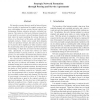Free Online Productivity Tools
i2Speak
i2Symbol
i2OCR
iTex2Img
iWeb2Print
iWeb2Shot
i2Type
iPdf2Split
iPdf2Merge
i2Bopomofo
i2Arabic
i2Style
i2Image
i2PDF
iLatex2Rtf
Sci2ools
150
click to vote
FOCS
2006
IEEE
2006
IEEE
Strategic Network Formation through Peering and Service Agreements
We introduce a game theoretic model of network formation in an effort to understand the complex system of business relationships between various Internet entities (e.g., Autonomous Systems, enterprise networks, residential customers). This system is at the heart of Internet connectivity. In our model we are given a network topology of nodes and links where the nodes (modeling the various Internet entities) act as the players of the game, and links represent potential contracts. Nodes wish to satisfy their demands, which earn potential revenues, but nodes may have to pay (or be paid by) their neighbors for links incident to them. By incorporating some of the qualities of Internet business relationships, we hope that our model will have predictive value. Specifically, we assume that contracts are either customer-provider or peering contracts. As often occurs in practice, we also include a mechanism that penalizes nodes if they drop traffic emanating from one of their customers. For a ...
Business Relationships | FOCS 2006 | Nash Equilibria | Theoretical Computer Science | Various Internet Entities |
Related Content
| Added | 11 Jun 2010 |
| Updated | 11 Jun 2010 |
| Type | Conference |
| Year | 2006 |
| Where | FOCS |
| Authors | Elliot Anshelevich, F. Bruce Shepherd, Gordon T. Wilfong |
Comments (0)

